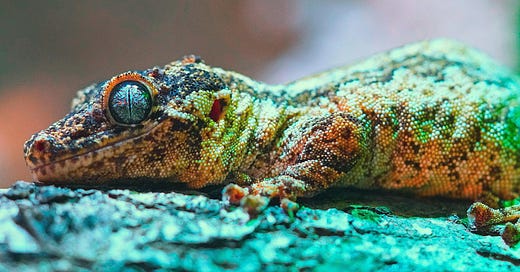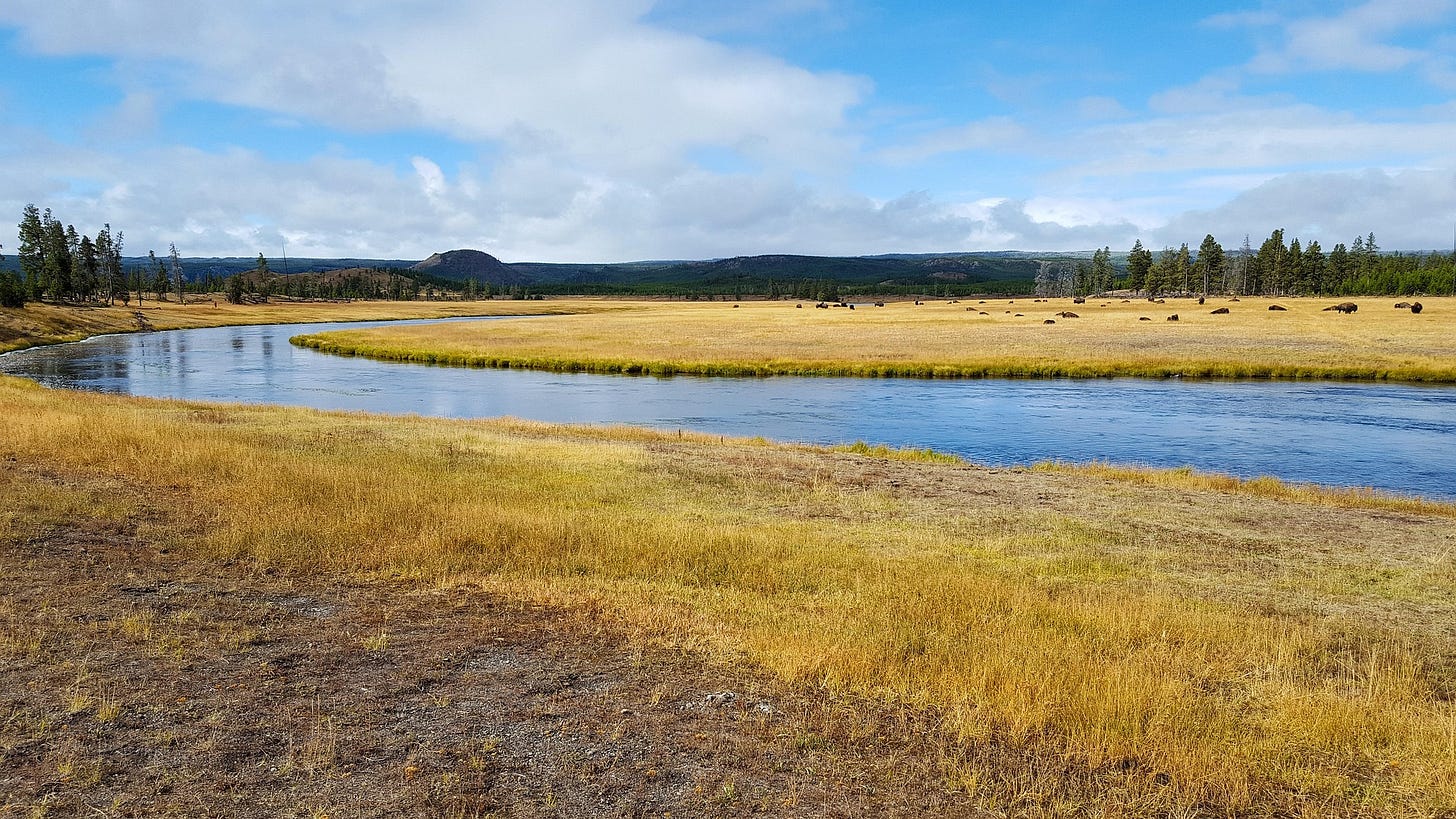An Argument for "Pro-Biodiversity Journalism"
Reporting about the world fairly and accurately does not mean we need to be dispassionate about protecting the diversity of life on Earth.
In March 2021, journalist Mehdi Hasan, then of MSNBC, brought a potentially provocative idea to an interview with Esquire. The interview took place shortly after the January 6th riot on the Capitol, which attacked the results of a free and fair election — and Hasan weighed in on how the media should cover this, and other, assaults on democracy:
…there is a sense that we live in an era where democracy is under massive threat. The New York Times had that headline, “Democracy has prevailed.” I don't buy that. I think we dodged a bullet with January 6th, and with the Trump election claims, but there's no doubt in my mind that come 2024, we're probably going to do this again, and at some point they will be successful. Democracy is still under threat from people other than Donald Trump. Journalists should not be neutral about democracy. Journalists should have a bias in favor of democracy. That is a bias we should be proud about, open about, and not hide or run away from. If journalists are not pro-democracy, then what is the point of being a journalist?
The phrase “journalists should have a bias in favor of democracy” may be shocking to some casual observers, mostly because of the “journalism should have a bias” part. But Hasan isn’t the only journalist or media critic to say something like this in recent years. In 2022, for example, Stefanie Murray, of the Center for Cooperative Media at Montclair State University, used her contribution to Nieman Lab’s “Predictions for Journalism 2023” to argue that, when it comes to democracy, “both sides” of an issue are not equally valid:
There are not two sides to hate. There are not two sides to straight-up lies. There are not two sides to basic human rights and dignity.
There are not two sides to democracy.
For decades, the largest media organizations in the United States have styled themselves as the Fourth Estate. A free and fair press is critical to democracy, right? Or consider that “democracy dies in darkness.”
Yet the U.S. media keeps allowing itself to be used again and again and again as a tool against democracy because it cannot break out of a completely outdated way of covering politics.
The phrase “pro-democracy journalism” now shows up everywhere, representing the latest development in a new philosophy of journalism that challenges the traditional goals of pure objectivity from a dispassionate observer. And if we can accept that democracy is a value so fundamentally good that even a journalist — whose role is to portray the truth unvarnished by ideology or preconceptions — should proudly proclaim themselves in favor, then other values, too, may meet that standard.
To me, biodiversity, and the preservation of biodiversity, is such a value — and I think any journalist covering the natural world should embrace “pro-biodiversity journalism.”
But before I get into what I think “pro-biodiversity journalism” might look like, let’s take a step back. Many media critics, not to mention many journalists, have looked at one of the tenets of traditional journalism — the journalist as an objective observer — and found a lot of flaws. For one, who gets to decide what’s considered “objective” and what’s conjecture? When reporting on something like the events of January 6, for example, is it objective to describe the crowd as a “violent mob,” or would “passionate crowd” be more objective? One reporter could argue that the phrase “violent mob” carries too many connotations and assumptions, but another reporter could argue that it’s malpractice not to describe rioters who smashed windows and beat police officers as a “violent mob.” If the goal is to help the reader understand the reality of what happened that day, these kinds of word choices are important. Who gets to decide what’s appropriate?
As a result of these and other questions, many journalists have abandoned the traditional “view from nowhere” — which sees the journalist as a dispassionate observer relaying information — and embraced the idea of telling the reader who they are, what they think, or how they interpret ideas. The goal here isn’t to elevate the journalist’s opinion as the truth, but rather to give the reader a better sense of who’s reporting the news, and how that reporter’s experiences and assumptions might shape their reporting. It also frees the journalist to be more human, and less automaton.
This, in my opinion, is a more honest form of journalism. Instead of pretending that any individual reporter can be wholly objective, this philosophy of journalism acknowledges that each reporter is a real person who may see things differently than another reporter. With this acknowledgment, we tell the reader who we are, and let the reader decide whether to trust us.
With “pro-democracy journalism,” journalists can be honest about where they stand on the issue of democracy: They are in favor. In journalism, this really shouldn’t be controversial, and Hasan’s question — If journalists are not pro-democracy, then what is the point of being a journalist? — raises a fair point. Journalism, at least ideally, should be about the democratization of information. Journalists should strive to help everyone, anyone, understand what is happening in the world, make sure powerful people can be fairly scrutinized by the public, and provide a service of public education. All of these actions are fundamental to, and reflective of, the idea of democracy — a society where we all have both the ability and the responsibility to shape that society.
But support for democracy is still a reflection of a value that we choose to uphold — and by embracing “pro-democracy journalism,” we assert our support for that value.
That begs the question: What other values might we be willing to support in our reporting? After all, many people, both now and throughout history, would actively argue against the concept of democracy, even if many people find that idea ridiculous now. What other values do we believe are so fundamentally good that there is no use in reporting “both sides” of the issue with equal deference, no use in pretending like both proponents and opponents of that value have equally important things to say?
Here’s where we get to biodiversity.
The world’s ecosystems, from the pitch-black depths of the ocean full of anglerfish and squid to the cold peaks of the Himalayas, where snow leopards hunt for blue sheep, are a value. These places, these wildlife, each hunt, each nibbled shrub, the mess of nutrients that flow all around, each new birth, each untimely end — these things are what make our home, our home. And without them, what would be the purpose of human life? What is human life without the crunch of a fresh loaf of bread, baked from grasses that once reached toward the sun? Without waking up to a shrill Northern Cardinal singing on a snowy day? Without the knowledge that, somewhere, a rhinoceros stands firm as the sun drops low over the savanna?
The world’s ecosystems sustain us, orient us, and ground us. We project our stories and visions onto creatures like quetzals, eagles, and deer. Some species, like crocodiles, sharks, and hemlock, we fear. Others, like squirrels or that tiny hippo on the internet, make us laugh. Places like the rainforest and deep caves support creatures that live in ways our species could never, confusing and humbling us. And in some creatures, like gorillas or a pair of birds nesting in our backyard, we may even see a reflection of ourselves.
Without other life, there is no point in living. And I don’t think it should be controversial for any journalist to proudly declare a bias toward life.
So what might “pro-biodiversity journalism” look like? Well, let’s start with what it shouldn’t look like. It shouldn’t mean automatically supporting any organization, person, or government working (or claiming to work) to protect that biodiversity. It should go without saying that the people who protect and study biodiversity are still people, and thus fallible. In addition, even good ideas can have flaws, and even well-meaning projects can have drawbacks, which should be reported on. The validity of any conservation project, or any piece of research, should always be interrogated. Pro-biodiversity journalism shouldn’t mean that a journalist’s responsibility — to report the truth, the whole truth, and nothing but the truth (to borrow a phrase) — should be overshadowed by belief, hope, or appreciation in any person, initiative, or idea.
But “pro-biodiversity journalism” can mean that the importance of protecting biodiversity isn’t up for debate. The idea that all life has inherent worth, that the products of evolution are unquantifiably meaningful, and that conserving every single facet of every single ecosystem is noble — none of it is up for debate, and anything that threatens these ideas should be identified as threatening to the core value of living on this planet.
Is this just my opinion? Well, in the spirit of a more honest form of journalism, I’m willing to admit what I, personally, believe. I believe publically owned lands are important, and collective stewardship of nature through a democratic government is one of the best ways to use those lands. I believe science should search for knowledge about how the world works and help us keep the world’s ecosystems intact and thriving. I believe people are just as much a part of the world’s ecosystems as any other species, despite the harms we sometimes cause. I also believe that our impact on the world can actively improve life for other species, if we choose to do so. I do not believe that industries like farming and ranching are inherently incompatible with biodiversity — in fact, I believe that agriculture can be a force for good. I do believe the Ivory-billed Woodpecker is definitely extinct.
I believe that by reporting and writing about the world’s ecosystems, journalists can help us understand our home a little more. I believe good journalism can scrutinize the powerful people and ideas that will shape the future of the world’s biodiversity. I believe journalism can educate us on how that future is shaping up.
Most of all, I believe that everyone has the ability and the responsibility to protect and nurture the future of life on Earth, in all its forms. And I believe journalists have a democratic duty to help us do so.







